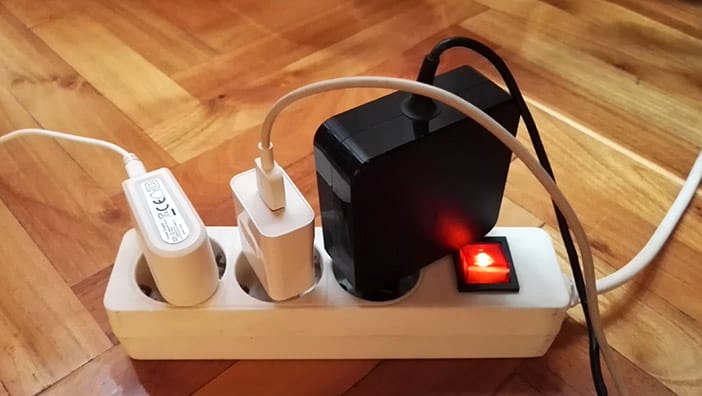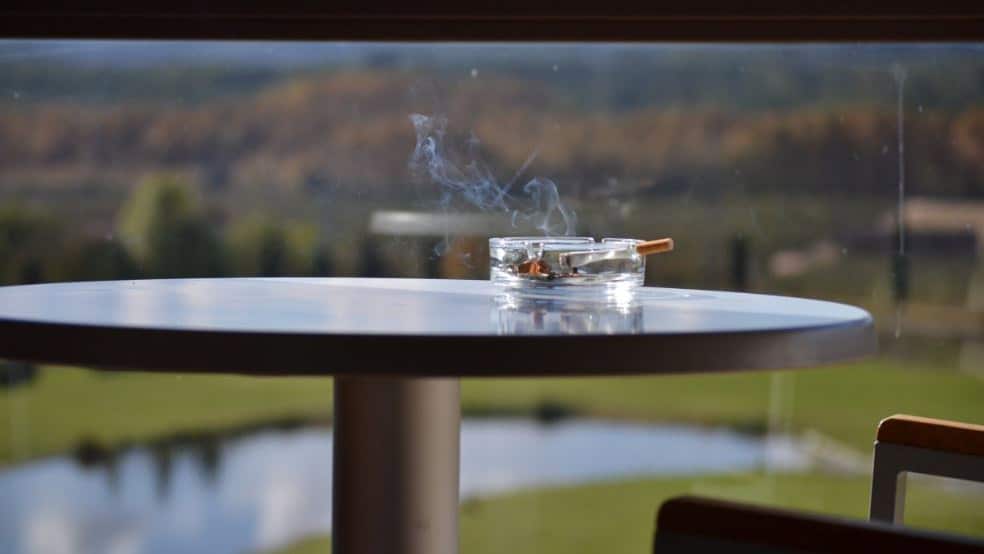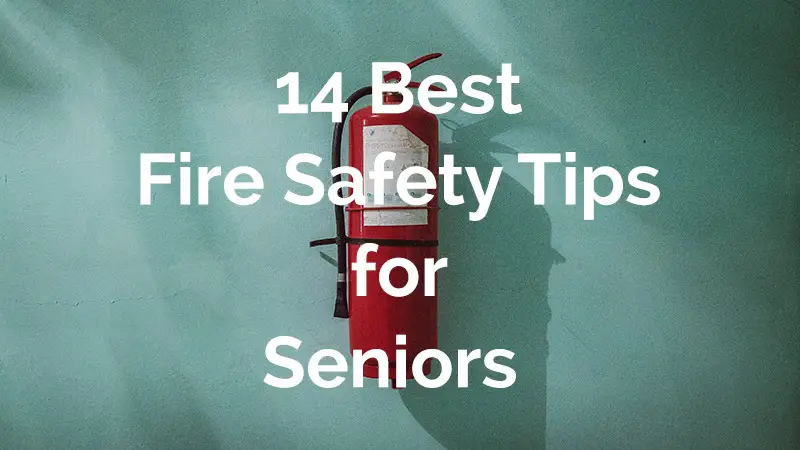According to the National Fire Protection Association adults older than 65 years have a doubled risk of fire-related injury or death compared to the average population. Sometimes inevitable accidents happen, but many home fires can be prevented by taking some basic safety measures.
The most common causes of fires are breaking cooking safety rules, faulty electrical devices, smoking, and heating equipment. Let’s see how you can prevent them with the help of some simple fire safety tips.
1. Avoid Electrical Circuit Overloads
When you connect too many devices to an electrical circuit at the same time, it becomes overloaded. More often than not, the built-in circuit breaker shuts the power off, but in some rare cases, a faulty breaker leads to overheating and fire. Seniors sometimes forget about this fire safety rule. So, always make sure there aren’t too many devices connected to a single circuit, including power strips.
Remind your elderly loved ones not to connect too many devices to the same circuit and especially don’t use them at the same time. For example, when vacuum cleaners, washing machines, microwave ovens, and hair dryers are all connected to the same power strip and used at the same time, they can cause an overload in certain situations. Space heaters should always be plugged directly into wall sockets.

2. Never Leave Clutter and Flammable Materials Close to a Power Strip
Power strips sometimes produce a significant amount of heat during their operation. That’s why it’s important to remove any flammable material that’s too close to a power strip. Pay special attention to paper and Kleenex because they catch fire really fast and easily.
When a power strip or an electrical appliance becomes overheated, unplug it immediately. Don’t forget to call seniors’ attention to do the same if they notice any unusually hot device or power strip.
3. Use Heating Equipment the Proper Way
First of all, have chimneys and heating equipment checked by a professional once a year. It will help you and your elderly loved ones to prevent carbon monoxide poisoning and fires that faulty appliances could cause.
Keep any flammable material, like clothes, curtains, paper, etc. at least 3 feet away from heating equipment. Pay special attention to ashes: seniors sometimes don’t wait until ashes cool down and pour them into a plastic container that’s very hazardous. Make sure there’s a metal container for the sole purpose of pouring ashes into it. Also, call seniors’ attention to always wait until ashes cool down before removing them from the fireplace. It’s a good idea to place a reminder on the wall of the container that says something like this: “Only cool ashes”.
Make sure seniors never leave heaters on at night or when they leave the room. There are models that can be programmed to switch off automatically at certain times of the day.
4. Prevent Fires Caused by Smoking

Many serious injuries and deaths are caused by careless smoking every year. Smoking is one of the leading causes of home fires and elderly smokers are at a much higher risk.
Most seniors fall asleep pretty easily even in a sitting position, so make sure they never smoke in the bed or in the armchair. Seniors should never smoke under the influence of alcohol or drugs that reduces alertness. They can make elderly people even sleepier and light-headed.
Call their attention to never leave burning cigarettes unattended and to never empty the ashtray right after smoking: they should always wait until the ashes cool down completely.
Ashtrays should be kept at a safe distance from any flammable material.
Seniors who suffer from certain diseases (e.g. COPD) have to use medical oxygen at home. Make sure they NEVER smoke near the oxygen tank.
I know many seniors insist on smoking inside but try to convince them to walk outside whenever they can. By smoking outside one can prevent the vast majority of accidents related to smoking.
If your elderly loved ones tend to forget things easily, it’s always a good idea to print core messages and stick them into well-visible places.
5. Not All Type of Smoke Detectors Work for Seniors
Many older people suffer from some degree of hearing impairment. Those with serious hearing loss often won’t wake up at night to the sound of the smoke alarm because they just can’t hear it (many seniors take their hearing aids out at night).
Smoke detectors are a must when it comes to fire safety. However, when buying, also consider the needs of your elderly loved ones: if they suffer from hearing loss you should choose a smoke alarm with high intensity flashing lights that can wake them up in case of emergency.
Gentex is a well-known and trusted electronics company that has pretty reliable smoke detectors with both visual (strobe) and audible alarms. When it’s needed you can complement the smoke detector with a pillow shaker for further safety.
Besides smoke alarms, I suggest you also install approved carbon monoxide detectors if there are fuel-burning appliances in the house or apartment (here you can find an illustrated guide on the places you should mount CO detectors).
Carbon monoxide is an odorless and colorless gas that can cause serious, life-threatening poisoning. It’s usually produced by faulty appliances that fail to burn gas, oil, or other fuels containing carbon. So it has to do more with heating safety but it can literally save lives.
Don’t forget to check smoke alarms and carbon monoxide detectors regularly according to the instructions of the manufacturer.
6. Keep the Fire Extinguisher(s) in an Easily Accessible Place
Fire extinguishers, such as smoke detectors, are a must in every household. Often you will need more than one of them, especially if the house has several rooms or your elderly loved ones have mobility difficulties.
The kitchen is one of the places where fires happen most often, so it’s always a good idea to keep a fire extinguisher close to it, but at a safe distance from the stove (e.g. mounting one next to the kitchen door). Multi-purpose (ABC), class B, and class K extinguishers are suitable for grease and oil fires. The National Fire Protection Association recommends you have ABC fire extinguishers in your home (as a side note, we have a full guide on fire extinguisher types here).
Call seniors’ attention to never pour water on burning oil because that would spread the fire and lead to serious injuries.
Many fires occur at night, so you should also keep a fire extinguisher in the bedroom. Sources of heat, like fireplaces and furnaces, are potential sources of fires and seniors should have a fire extinguisher close to them as well. If the house has multiple floors, keep a fire extinguisher on each one at an easy-to-reach place.
It’s important to explain the usage of the fire extinguisher for seniors thoroughly. Make sure they can use it properly in case of an emergency.
7. Avoid Loose Clothing While Cooking
Make sure seniors don’t wear loose clothing during cooking or any other activity that involves the use of open flame. Clothes, especially those made from synthetic and mixed fibers can catch fire easily. Seniors should always tie back long hair and jewelry while cooking for the same reason. Wearing flame retardant clothes can provide extra security.
If clothes catch fire, experts suggest applying the “stop, drop and roll” method: stop, drop to the floor as soon as you can while covering your face with your hands and roll back and forth to extinguish the fire. The goal is to deprive the fire of oxygen.
An effective method to avoid the majority of cooking-associated fires is to never leave the kitchen until the stove is in use.
The kitchen is a particularly dangerous place for seniors where most accidents happen. To avoid those, we’ve collected the best cooking safety tips in this article and we’ve also created a comprehensive guide on kitchen safety for seniors.
8. Print the Phone Number of the Fire Department and Stick It into a Well-Visible Place
Seniors tend to forget phone numbers, especially when there’s a stressful emergency situation. Place the phone number of the local fire department (or 911) in a place where they can see it easily. It’s also a good idea to set up speed dial on seniors’ mobile and landline phones so they can call help by pressing a single button. This way some really valuable time can be earned in case of an emergency.
9. Install an Automatic Stove Shut Off Device
Active seniors often use the stove, however, there’s a chance they leave the kitchen and start doing something else. In these cases, they often forget that they’ve started cooking. This is when an automatic shut off device comes in handy.
After attaching the gadget to the stove it automatically shuts the stove off if there’s nobody in the kitchen for a certain period of time. It uses motion sensors and in the absence of movements, it simply closes the gas valve. If unattended cooking is a recurring problem this device can really give you greater peace of mind.
Using a timer during cooking can only be an alternative solution if seniors don’t forget to set it.
10. Don’t Leave Flammable Substances near Hot Places or Open Flame
Make sure that everything that can burn is more than 3 feet away from hot places at seniors’ homes. Among others pay special attention to papers, curtains, mattresses, textiles, flammable liquids, oils, aerosols.
Don’t forget about the stove and space heaters, and check if there’s something flammable close to them.
11. Have a Fire Escape Plan
Make sure seniors know two ways to escape from each room. If they’re forgetful, remind them of the steps of the escape plan from time to time. Practicing is as important as theory, so make sure they can open the windows and the doors easily and fast.
Check the escape routes and remove any obstacles that block doors and windows or make escaping harder and slower.
12. Not Every Senior Will Benefit from a Flame Retardant Mattress
Buying a fire-retardant mattress is not the first step in fire prevention, however, sometimes it can add an extra layer of safety. Usually, seniors who smoke in bed will benefit the most from it, and in their case, a fire retardant mattress can be life-saving.
However, some flame retardants (e.g. organohalogen ones) are potentially dangerous and their presence in a product can lead to various health issues. So, always inform and consider the benefits and risks before purchasing a flame retardant mattress.
13. Keep Flashlights Within Reach
Seniors should always have flashlights at easily accessible places in their homes. Many times fires occur at nighttime and damage the electrical network. If there’s no lighting, escaping becomes much more difficult, especially for seniors. An operable flashlight can dramatically improve their chances of getting out in time.
14. Educate Your Senior Loved Ones
Taking precautions is an important and essential part of fire safety but it’s useless if seniors don’t understand what they should do in an emergency. Take smoke detectors, for example; they’re useless if seniors don’t know what the alarm sound means or what to do when they hear it.
You should always make sure seniors not only understand but they can also recall what to do in case of a fire and they’re aware of the basics of fire prevention. Pay special attention to elderly people with some degree of dementia. They often won’t admit it if they don’t understand or recall something as they’re ashamed of their forgetfulness. Repeat and make them practice the key elements of fire safety as many times as necessary. Be patient and understanding.
Summary
When there’s a fire it’s vital to act as quickly as possible. A home fire can become life-threatening within just a few minutes. Seniors, especially those with cognitive impairment, react slower and sometimes they become confused in an emergency so in their case prevention is particularly important.
Fortunately, most home fires can be avoided by taking the right precautions and educating your elderly loved ones. Within only a few hours you can considerably improve fire safety in your loved ones’ homes, and it’s always well worth the invested time. Don’t wait until an accident happens, start acting today.
To have an idea of how important it is to act fast in case of a fire, watch the video below. Every second counts.












